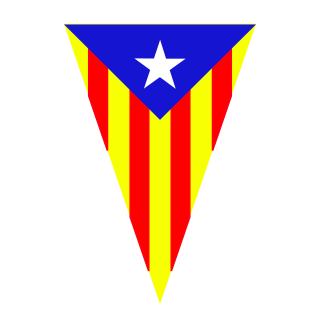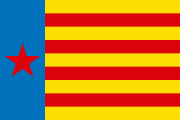
The Catalan Countries are those territories where the Catalan language is spoken. They include the Spanish regions of Catalonia, the Balearic Islands, Valencian Community, and parts of Aragon and Murcia (Carche), as well as the Principality of Andorra, the department of Pyrénées-Orientales in France, and the city of Alghero in Sardinia (Italy). It is often used as a sociolinguistic term to describe the cultural-linguistic area where Catalan is spoken. In the context of Catalan nationalism, the term is sometimes used in a more restricted way to refer to just Catalonia, Valencia and the Balearic Islands. The Catalan Countries do not correspond to any present or past political or administrative unit, though most of the area belonged to the Crown of Aragon in the Middle Ages. Parts of Valencia (Spanish) and Catalonia (Occitan) are not Catalan-speaking.
The Republican Left of Catalonia is a pro-Catalan independence, social democratic political party in the Spanish autonomous community of Catalonia, with a presence also in Valencia, the Balearic Islands and the French department of Pyrénées-Orientales. It is also the main sponsor of the independence movement from France and Spain in the territories known as Catalan Countries, focusing in recent years on the creation of a Catalan Republic in Catalonia proper. Its current president is Oriol Junqueras and its secretary-general is Marta Rovira. The party is a member of the European Free Alliance.

Valencian Left is a nationalist Valencian leftist party founded in the Valencian Community, founded in April, 1998 a group of ex-members of Unitat del Poble Valencià formed left this party and went to form a new political group using the vacant name of the historical Esquerra Valenciana. EV's current president is Robert Mora.
Republican Left of the Valencian Country is a Valencian left nationalist and republican party.

Agustí Cerdà i Argent is a Spanish politician, president of the minority Catalan nationalist party Republican Left of the Valencian Country since its foundation in September of year 2000. He was a Spanish MP during the 2004 term.

Estat Català is a pro-independence nationalist historical political party of Catalonia (Spain).
The names of the Valencian Community are diverse, even though Comunitat Valenciana is the only denomination with official status in its Statute of Autonomy. Nonetheless, this legal document includes in its Preamble other legal denominations that portray the history and nature of the territory: Regne de València and País Valencià.
Blaverism is a Valencian regionalist ideology in the Valencian Community (Spain) that emerged with the Spanish transition to democracy characterised by strong anti-Catalanism, born out of its opposition to Joan Fuster's book Nosaltres, els valencians (1962), which promoted the concept of the Catalan Countries which includes Valencia. They consider Fuster's ideas as an imperialist Catalan nationalist movement that tries to impose Catalan domination upon Valencia. Blaverism takes its name from the blue fringe which distinguishes the Valencian flag from other flags with a common origin, particularly from the Catalan.
Valencian nationalism or Valencianism is a political movement in the Valencian Community, Spain.

The Grup d'Acció Valencianista (GAV) is a pro-Valencian blaverist organization which was created in 1977. They define themselves as "the fighting and warlike faction of real valencianism". Nonetheless, they are generally considered as an extreme right group due to their activities.
The Left for the Right to Decide was an electoral alliance formed for the 2014 European Parliament elections. The leading candidate was Josep Maria Terricabras.

Commitment for the Valencian Country was a Valencian political coalition formed for the 2007 Valencian regional election by United Left of the Valencian Country (EUPV), Valencian Nationalist Bloc (Bloc), The Greens of the Valencian Country (EVPV), The Greens–Ecologist Left of the Valencian Country (EV–EE) and Republican Left (IR). After the coalition's failure to fulfill expectations, it was not renewed for the 2008 Spanish general election, where Valencian People's Initiative (IdPV), a split-off from EUPV, chose to run together with the Bloc and EV–EE in opposition to the United and Republican Left alliance.

Julio Just Gimeno was a Spanish journalist and politician who was minister of public works during the early part of the Spanish Civil War (1936–1939).

United Left of the Valencian Country is the Valencian federation of the Spanish left wing political and social movement United Left. Marga Sanz is the current General Coordinator and Ignacio Blanco Giner its spokesperson.

És el moment, also named as Compromís–Podemos–És el moment, was an electoral alliance formed by Coalició Compromís and Podemos in November 2015 to contest the 2015 Spanish general election in the Valencian Community. United Left of the Valencian Country (EUPV) had also entered talks to enter the coalition, but left after disagreements with Podemos and Compromís. The alliance scored in second place in the Valencian Community in the 2015 election, only behind the People's Party (PP).
Valencian regionalism is a cultural and political movement that advocates the revival of the identity of the region now within the Valencian Community in eastern Spain. Politically, the regionalists support the administrative decentralisation of the Spanish state and, for some, the recognition of Valencian foral law and increased autonomy for the Valencian Community. The movement emerged during the early years of the Bourbon restoration in the last third of the 19th century. It took political shape during the early 20th century, and persisted in a controlled and attenuated form through the Francoist State. After the restoration of democracy, the regionalist tendency was challenged by a Valencian nationalism with some left-wing and pan-Catalanist associations. Regionalism took on a right-wing and anti-Catalanist outlook which became known as Blaverism, and was represented politically by the Valencian Union until the absorption of that party into the People's Party in 2011.
Esquerra Unida–L'Entesa or simply L'Entesa was a Valencian electoral alliance formed by United Left of the Valencian Country (EUPV), Valencian Left (EV) and The Greens (EV/LV) to contest the 2003 Valencian regional election. The alliance also included the Socialist Party of the Valencian Country (PSPV–PSOE) in six municipalities in the judicial district of Sueca to contest the 2003 Spanish local elections.

Valencian Nationalist Left is a left-wing valencian nationalist political party founded in the Valencian Community in 1979, as a refoundation of the previous Valencian Regional Union.

The Greens–Ecologist Left of the Valencian Country was a green political party in the Valencian Community founded in 2004 as a split from The Greens (EV/LV), in response to EV/LV's alliance with the Spanish Socialist Workers' Party (PSOE) for both the 2004 Spanish general and European Parliament elections.

Green Left–Initiative for the Valencian Country or just Green Left was a political party in the Valencian Community founded in May 2001 from the Nova Esquerra faction within the Democratic Party of the New Left (PDNI). It was led by Valencian MP Joan Francesc Peris, previously a member from United Left of the Valencian Country (EUPV), who had been elected in the 1999 Valencian regional election in the PSOE–PDNI electoral alliance.













